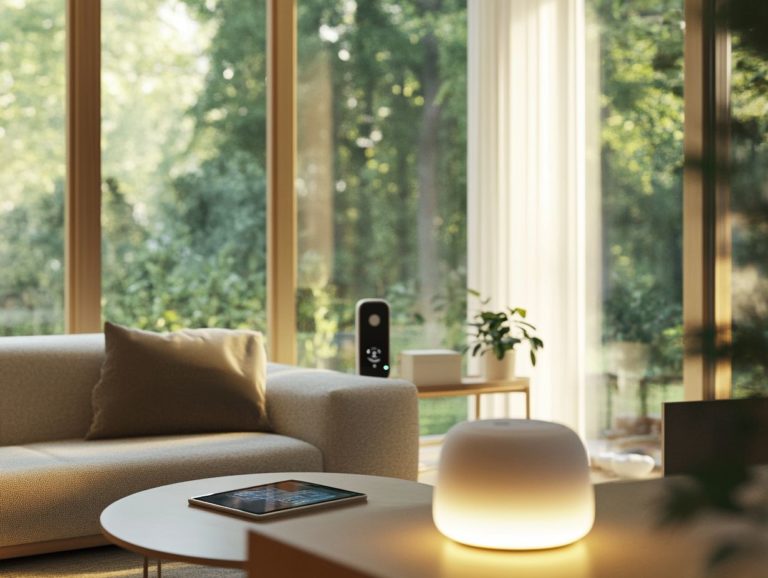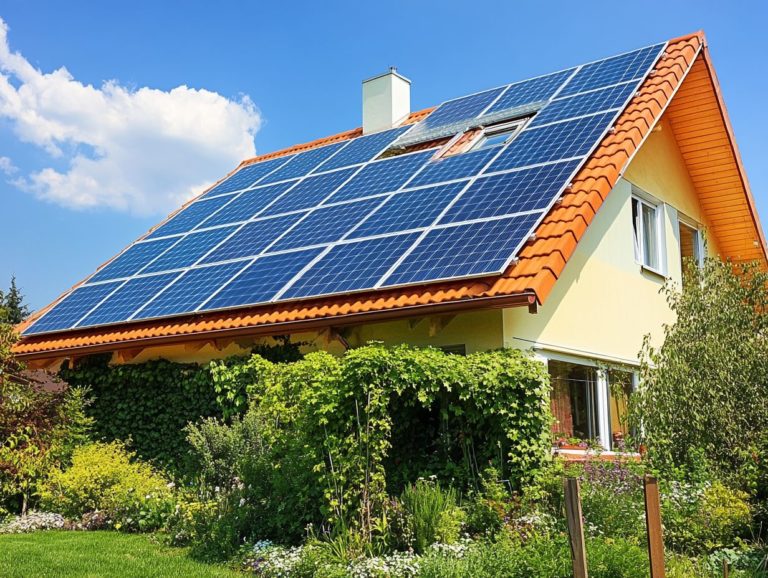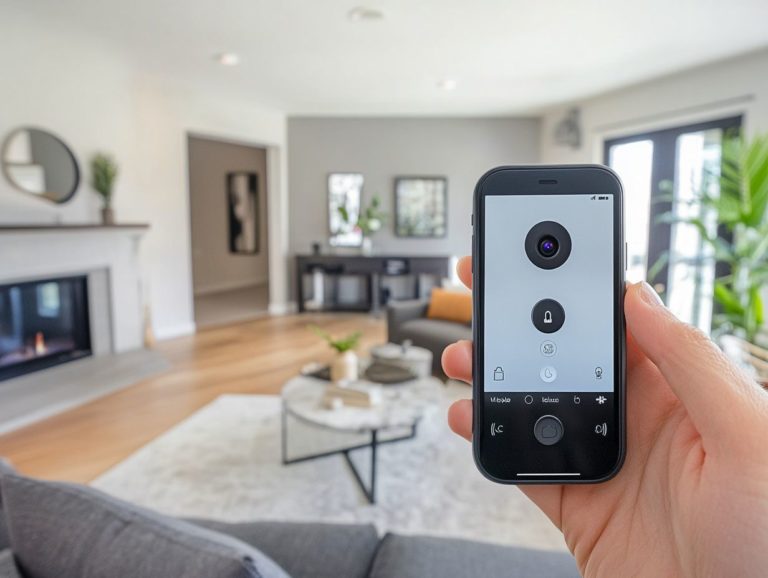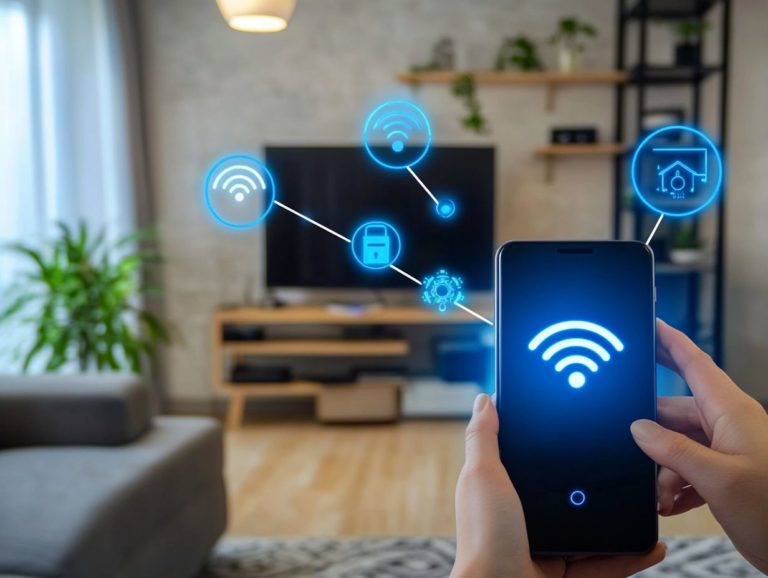Exploring the Benefits of Smart Home Technology
Transform your life with smart home technology that blends convenience and security seamlessly!
Innovations range from smart lighting systems to advanced security cameras, transforming daily tasks into effortless experiences. This article will define smart home technology, delve into its myriad benefits, and explore the various types of devices that can elevate your living space.
You ll also find practical tips for implementation and address crucial concerns about privacy and compatibility. Discover how these advancements can truly enrich your home life!
Contents
Key Takeaways:
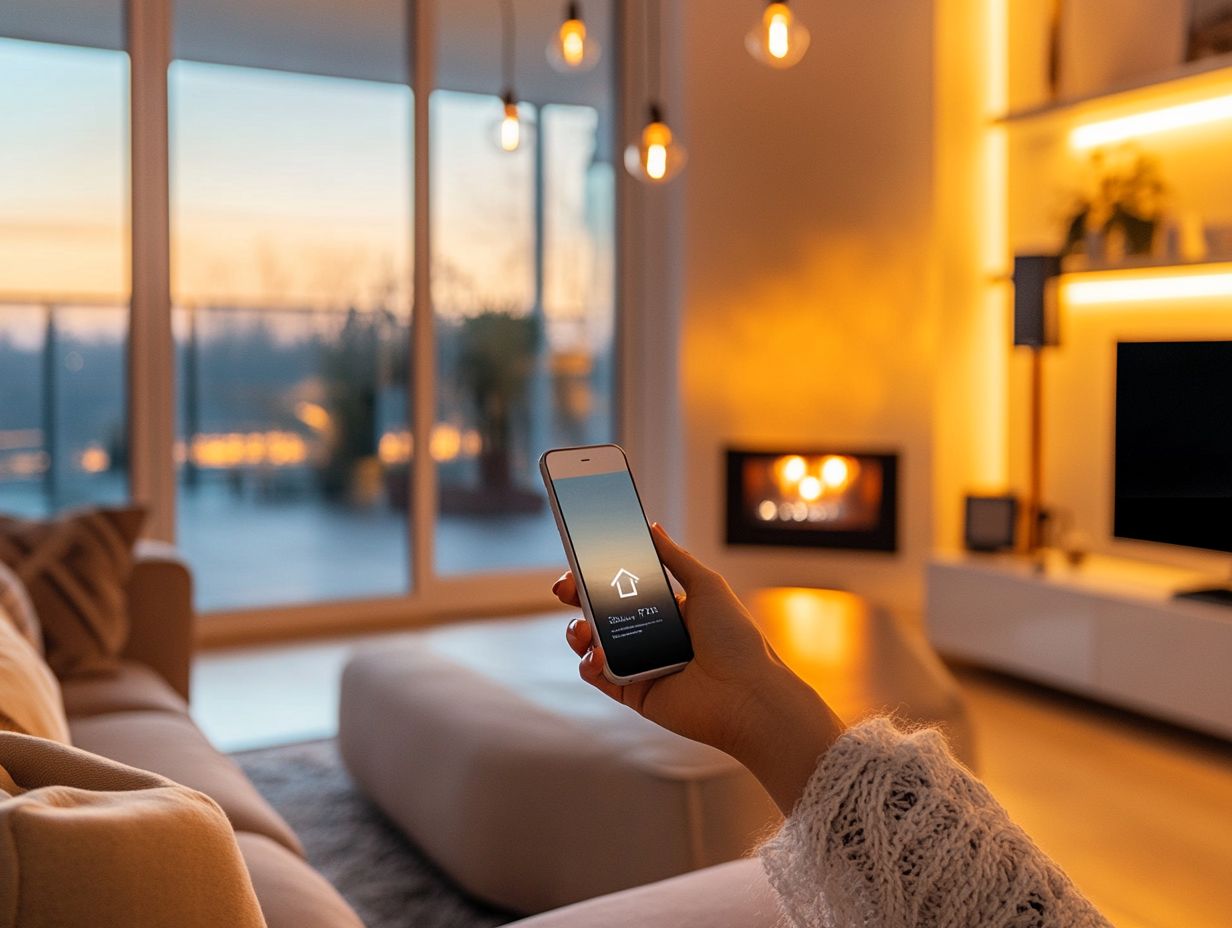
Smart home technology offers convenience and efficiency by empowering users to control various aspects of their home with ease, highlighting the top 10 benefits of smart home technology.
Investing in smart home technology can lead to significant cost savings in the long run through energy efficiency and automation advancements.
With enhanced security features such as remote monitoring and access control, smart homes offer peace of mind for homeowners.
What is Smart Home Technology?
Smart home technology is a network of interconnected devices designed to make everyday tasks easier and improve your home life.
This integration includes smart appliances, intelligent lighting systems, and advanced security cameras, all working together.
By utilizing the Internet of Things (IoT) a network of devices connected to the internet that can communicate with each other you can enjoy a seamless user experience. This gives you the power to control your home environment effortlessly through smart home apps or hubs.
Imagine managing your space with remote monitoring and voice commands via devices like Amazon Echo or Google Home. The outcome is an enriched lifestyle defined by unparalleled convenience, energy efficiency, and cutting-edge security features.
Defining Smart Home Technology
Smart home technology encompasses a range of advanced home automation systems and internet-connected devices that simplify your everyday living.
These innovations give you enhanced control over various aspects of your home, from lighting and heating to security features.
For instance, smart thermostats can learn your preferences and adjust temperatures automatically, striking the perfect balance between comfort and energy efficiency.
Smart lighting systems allow you to customize your environment through smartphone apps, enabling you to create the ideal ambiance while also reducing electricity consumption.
Security cameras and smart locks empower you to monitor your property remotely and receive real-time alerts.
Embrace these technologies now, and start enjoying a hassle-free lifestyle!
Benefits of Smart Home Technology
The advantages of smart home technology are vast, presenting you with the benefits of smart home automation, improved energy efficiency, heightened security, and unmatched convenience features.
These innovations revolutionize the way you engage with your living environment, elevating your everyday experience.
Convenience and Efficiency
Smart home technology enhances convenience and efficiency by enabling you to control your devices remotely through user-friendly apps that showcase the latest innovations in smart home technology.
This innovative approach simplifies your daily routines and plays a pivotal role in enhancing energy efficiency.
For instance, you can utilize voice commands with devices like Amazon Echo or Google Home to manage your lighting and thermostat settings. Just say, “Alexa, set the temperature to 72 degrees,” and achieve optimal climate control without lifting a finger.
With a simple command like, “Hey Google, turn off the living room lights,” you can minimize energy waste in unused rooms. This makes your home routines not only more streamlined but also environmentally friendly.
Are you ready to transform your home into a smart haven today? Explore the benefits of smart home energy management further and experience the future of living!
Cost Savings
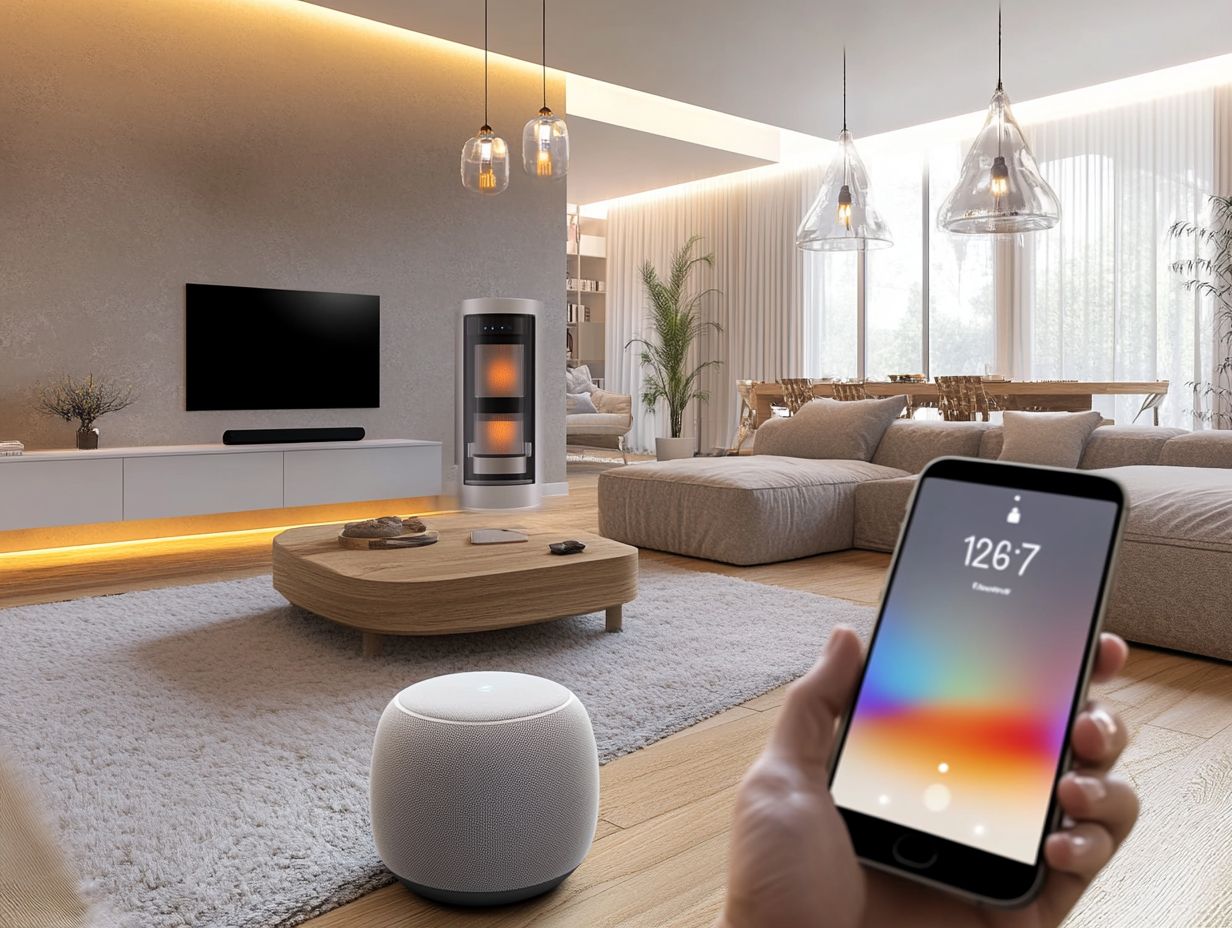
Implementing smart home technology can unlock amazing savings! This is especially true through how smart home tech can simplify living by improving energy efficiency and providing detailed monitoring of your usage data.
By integrating smart thermostats and smart plugs into your daily routine, you can dramatically lower your energy consumption. These devices automate temperature settings based on whether you’re home and provide valuable insights into your energy usage patterns.
You might discover that tweaking your habits based on this data leads to even greater reductions in energy costs. Many utility companies offer rebates and savings incentives to motivate homeowners like you to adopt smart technology. This makes it an even more appealing option as you modernize your space.
These incentives help offset initial expenses while boosting your long-term savings, benefiting both your household budget and your environmental goals.
Enhanced Security
Enhanced security stands out as one of the most compelling benefits of smart home technology. It allows you to monitor your property in real-time with smart security cameras and systems, while also highlighting how smart home tech can benefit the environment.
These advanced systems often come fitted with sophisticated features, such as motion detection, which senses movement and can send alerts to your phone. They also include remote access capabilities, letting you maintain control from anywhere through smartphone apps.
As the convenience of these technologies increases, so do concerns about data privacy and security breaches. Major manufacturers like Ring and Google Nest are well aware of these issues and are taking action by implementing robust encryption methods and user-friendly privacy settings that empower you to manage your data securely.
This dual focus on functionality and privacy is essential for building trust in smart home solutions.
Types of Smart Home Technology
You have a wealth of smart home technology options at your fingertips, spanning everything from individual smart devices to sophisticated automation systems. These innovations, detailed in how smart home devices improve quality of life, are designed to make your home more functional and simplify the way you manage your space.
Smart Home Devices and Systems
Smart home devices and systems form the backbone of home automation, encompassing a range of IoT (Internet of Things) devices designed to enhance functionality and convenience in your living space.
Take smart thermostats, for instance. They allow you to control your home’s temperature from anywhere or even set heating and cooling to align perfectly with your daily routine.
Smart lighting systems let you customize brightness and color, creating the ideal atmosphere while also championing energy efficiency.
In terms of security, smart cameras step up your home monitoring game with real-time alerts and accessible footage right through your mobile apps.
These devices are often compatible with various platforms, including voice assistants, seamlessly integrating into the smart home ecosystem. This puts you in command of your home environment like never before.
How to Incorporate Smart Home Technology
Incorporating smart home technology into your living space can truly transform your experience. You ll gain enhanced control and convenience by using smart home apps and hubs.
This innovation not only elevates your daily routines but also creates an environment tailored to your lifestyle.
Tips for Implementing Smart Home Technology
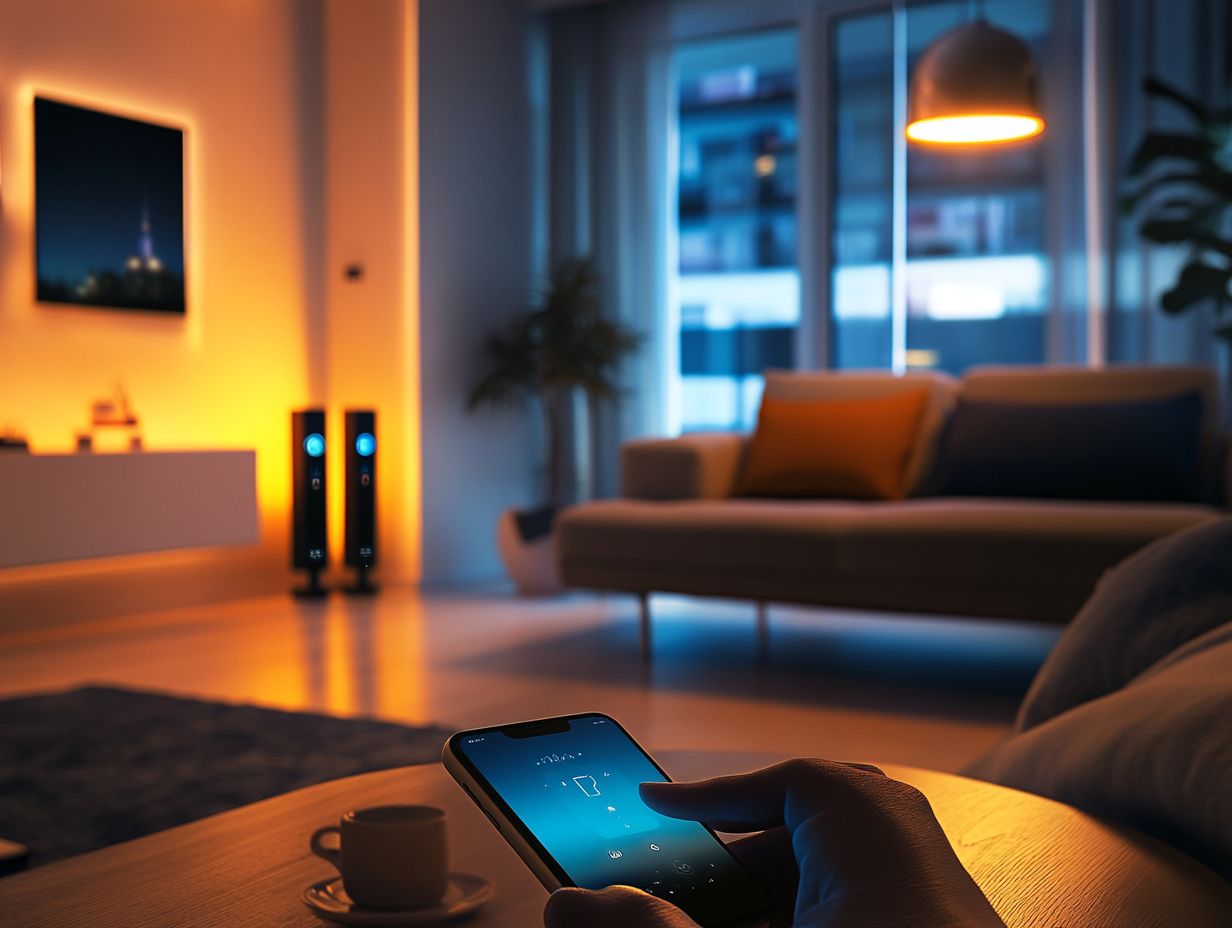
When you’re diving into smart home technology, it’s crucial to consider compatibility, device selection, and what your smart home hub can actually handle. Investing time in researching various products can dramatically elevate your user experience and ensure everything integrates smoothly.
Begin by checking if your existing devices play nicely with the new additions, as not all systems are created equal. Seek out ratings and reviews that showcase real user experiences with specific product combinations.
Focus on the devices that will truly enhance your daily life consider security cameras, lighting systems, or thermostats that offer just the right features you need.
Understanding each device’s functionality and how it interacts within your home ecosystem can lead to optimal performance and a seamlessly connected living space.
Potential Concerns and Considerations
Smart home technology brings numerous benefits, including the environmental benefits of smart homes. However, it’s crucial to consider the potential concerns surrounding privacy, security, and compatibility.
These factors are vital as you navigate the evolving landscape of connected devices.
Privacy and Security Issues
Privacy and security concerns are significant with smart devices. They often collect personal data, increasing the risk of breaches. Fortunately, many manufacturers are improving their security features by adding user-friendly privacy controls.
To safeguard your valuable information, follow these easy steps:
- Change default passwords.
- Utilize two-factor authentication.
- Use separate networks to keep your devices safer.
By taking proactive measures, you can enhance the protection of your personal information while enjoying the conveniences of smart home technologies.
Compatibility and Integration Challenges
Compatibility and integration challenges often arise when exploring smart home technology. These hurdles can create frustration, making it difficult to achieve a seamless connected home environment. That’s why selecting compatible devices is essential.
Standards like Matter are designed to streamline this process, ensuring devices from various manufacturers can communicate effortlessly.
If you encounter compatibility issues, check for software updates on your devices; these can often resolve conflicts. Also, ensure your Wi-Fi network is strong and stable. Strategically positioning routers around your home will help minimize dead zones, paving the way for a reliable smart home experience.
Frequently Asked Questions
What is smart home technology?
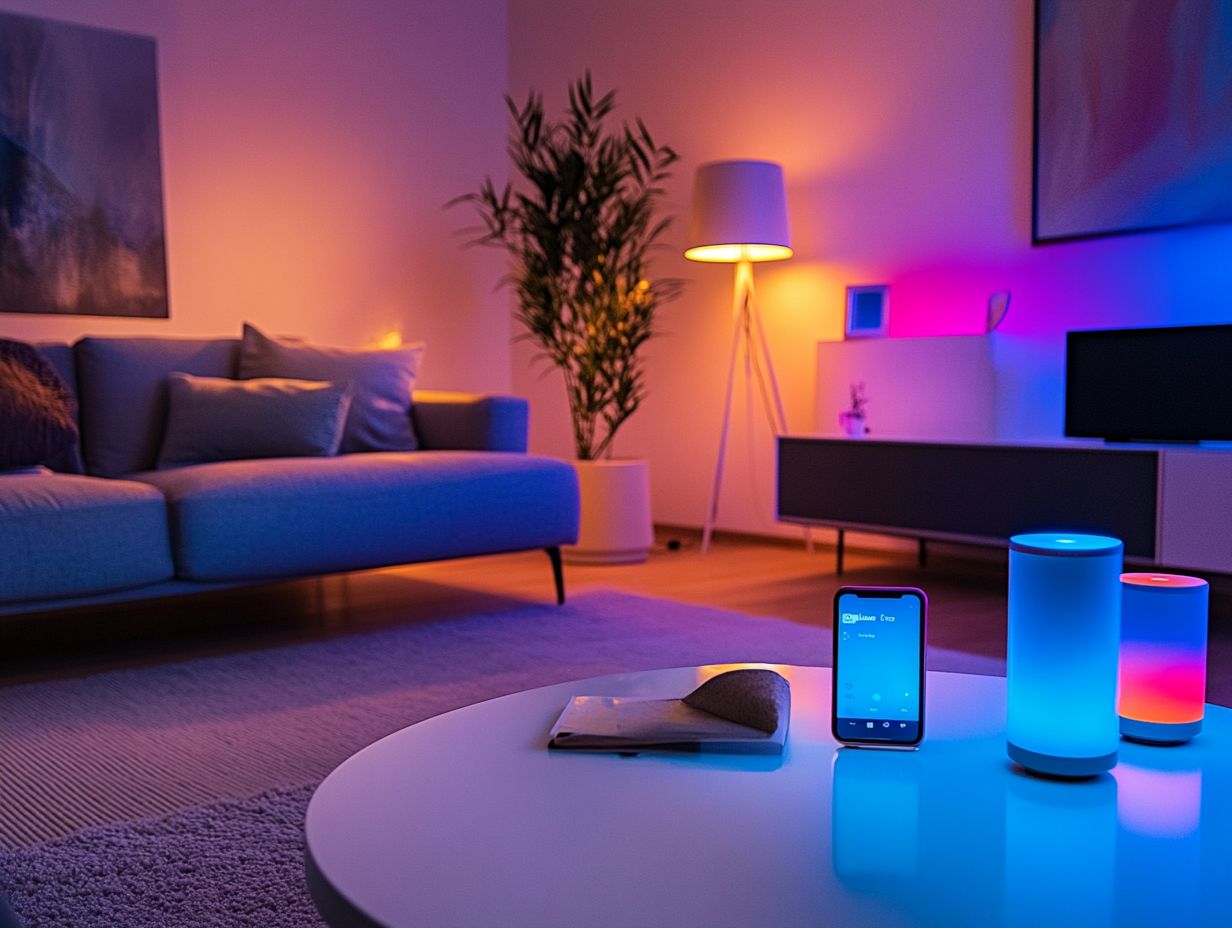
Smart home technology refers to devices and systems connected to the internet that can be controlled remotely to automate and simplify daily tasks. These devices include smart thermostats, lighting, security systems, and appliances.
What are the benefits of using smart home technology?
Benefits of smart home technology include:
- Increased convenience
- Improved energy efficiency
- Enhanced security
- Cost savings
How does smart home technology improve convenience?
Smart home technology allows you to control various aspects of your home lighting, temperature, and appliances with just a few taps on your smartphone or through voice commands. This eliminates the need for physical switches, making it easier to manage tasks on the go.
How can smart home technology help save money?
Smart home technology can save money in various ways. By automating tasks and adjusting settings based on usage patterns, it reduces energy consumption, resulting in lower utility bills. It can also prevent unnecessary maintenance and repair costs by providing real-time notifications and alerts.
Is smart home technology secure?
Most smart home devices come with built-in security features to protect your data and privacy. However, it’s essential to choose reputable brands and regularly update your devices to ensure maximum security.
Can I retrofit my home with smart home technology?
Yes, you can retrofit your home with smart home technology. Many devices are designed for easy installation and integration with existing systems. For complex installations, consulting a professional is recommended to ensure proper functionality and compatibility.
Ready to transform your home? Discover the latest in smart home technology today!

